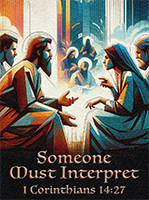First Corinthians 14:26–40 . . .
Orderly Worship
Following Apostle Paul’s highlighting of “the use of spiritual gifts” (chapter 12) and “love” (chapter 13), he now completes his focus on “the spiritual gift of tongues” (chapter 14), which had caused considerable chaos in the Corinthian church. To turn chaos in that church into order, as well as converting confusion into peace, it's clear that a list of orderly worship rules was extremely helpful then as it is today.
Like a good parent, Paul communicates his “house rules” by insisting that there must be order in the church. Herein, he gives instructions about the priority and proper exercise of these gifts, especially the gift of tongues.
Paul’s argument (as we reviewed in our previous study) is that although speaking in tongues is good (v. 5), it only edifies the speaker (v. 4). He’d rather that they placed their emphasis on the gift of prophesy, which edified all present, because it was spoken in the tongue of listeners (vv. 3–4). By way of illustration, Paul gives the analogy of music; he concludes that, as music without melody is useless (vv. 7–8), so is tongues without interpretation. It seems that the Corinthians habitually spoke in tongues without the necessary interpretation.
In addition, Paul points out that tongues is a sign for the unbelieving Jew (vv. 21–22). As the Corinthian church’s regular assembly consisted of believers, they should place their emphasis on believer-directed prophecy. If an unbeliever visited the church, he’d still benefit from the teaching (v. 24).
Today, we turn our eyes to the second half of chapter 14. Given the Corinthians’ spiritual condition, Paul couldn’t simply give them principles and let them apply them; thus he concludes this chapter by laying down guidelines that are less dependent on the Corinthians’ judgment (vv. 26–33, shown at the bottom of the page). That these rules were designed to bring order to the worship services is evident from the statement that “For God is not a God of disorder but of peace” (v. 33a), which is a crucial principle worth bearing in mind, then and now. The procedures in the worship setting, as emphasized by the apostle, aren’t to be disruptive but to be orderly. He’s already stated one reason for this principle; namely, that unbelievers will be turned off to the church if pandemonium occurs as a result of a free-for-all exercise of tongues (14:22–25). But there’s another reason: “God is not a God of disorder but of peace” (v. 33). Orderly worship reflects the character of God who now declares aloud, Order in my Church!
Woman in church Next, Paul returns to the discussion of the woman’s role in the worship service; many commentators see this as indicating that women were being disruptive because vv. 34–35 closely follow his statement that God is not a God of disorder or confusion. However, it’s possible that this command near the conclusion of the chapter follows Paul’s emphasis at the beginning regarding the Spirit’s testing (v. 32). He mentions two critical elements in v. 29. That: (1) others are to pass judgment on the one who prophesies; and (2) it’s not the woman’s role to pass judgment on men, since that would contradict the functional headship of men over women.
Paul concludes his attention-getting chapter 14 argument by saying that those who are spiritual should be able to follow his helpful guidelines. He gives two summary statements: the first emphasizes prophecy over tongues, because it edifies others; the second emphasizes order and respect in the worship service (vv. 39–40). These two verses serve as a concise summary of Paul's teaching on spiritual gifts in worship, balancing the encouragement of prophecy with the acceptance of tongues, while emphasizing the overarching principle of orderly worship that reflects God's character
Note: 1st Corinthians challenges believers to examine every aspect of their lives through the lens of the Gospel. In chapters 11–14, Paul presents these four challenges:
Covering the head in worship (ch. 11) | Concerning spiritual gifts (ch. 12)
The supremacy of love (ch. 13) | Intelligibility in worship (ch. 14)
› Watch BibleProject’s superb animated video (2 minutes) that highlights Paul’s messages in these four chapters.
† Summary of 1 Corinthians 14:26–40
First Corinthians 14:26–40 addresses orderly worship in the early Christian church, particularly focusing on the use of spiritual gifts and the conduct of believers during gatherings. Here’s a summary of the passage’s points:
• Order in Worship
Paul provides guidelines for orderly worship:
† Each person should come prepared to contribute (e.g., a hymn, teaching, revelation, tongue, or interpretation).
† Everything should be done for the edification of the church.
† Tongues should be limited and interpreted.
† Prophecies should be given in turn, with others weighing what is said.
• Regulation of Spiritual Gifts
† Only two or three should speak in tongues, and there must be an interpreter (v. 27).
† Two or three prophets should speak, while others evaluate the messages.
Prophets should be able to control their spirits.
• God of Peace, Not Disorder
Paul emphasizes that God is a God of peace, not disorder, and this should be reflected in worship practices.
• Role of Women
Paul addresses the role of women in the church gathering:
† Women should remain silent in the churches (v. 34).
† They’re not allowed to speak, but must be in submission.
† If they want to inquire about something, they should ask their husbands at home.
• Conclusion
Paul concludes by urging the Corinthians to:
† Be eager to prophesy (v. 39).
† Not forbid speaking in tongues.
† Ensure everything is done in a fitting and orderly way (v. 40).
This passage emphasizes the importance of orderly, edifying worship that reflects God’s character of peace and order.
- Q. 1 Why does God value peace and order so much (v. 33a)? How can our church further prioritize these characteristics?
- Q. 2 Paul says that if we fail to recognize the truth of his words, God won’t recognize us (v. 37). What does this mean in the context of spiritual gifts and the corporate worship service? What can you do to avoid this consequence?
- Q. 3 Has your understanding of tongues and prophecy changed as a result of this site’s study of 1 Corinthians 12–14? If so, what do you now believe about these gifts?
1 Corinthians 14:26–40
New International Version (NIV)
[You can view it in a different version by clicking here; you can also listen to this chapter.]
Good Order in Worship
26What then shall we say, brothers and sisters? When you come together, each of you has a hymn, or a word of instruction, a revelation, a tongue or an interpretation. Everything must be done so that the church may be built up. 27If anyone speaks in a tongue, two — or at the most three — should speak, one at a time, and someone must interpret. 28If there is no interpreter, the speaker should keep quiet in the church and speak to himself and to God.
29Two or three prophets should speak, and the others should weigh carefully what is said. 30And if a revelation comes to someone who is sitting down, the first speaker should stop. 31For you can all prophesy in turn so that everyone may be instructed and encouraged. 32The spirits of prophets are subject to the control of prophets. 33For God is not a God of disorder but of peace — as in all the congregations of the Lord’s people.
34Women should remain silent in the churches. They are not allowed to speak, but must be in submission, as the law says. 35If they want to inquire about something, they should ask their own husbands at home; for it is disgraceful for a woman to speak in the church.
36Or did the word of God originate with you? Or are you the only people it has reached? 37If anyone thinks they are a prophet or otherwise gifted by the Spirit, let them acknowledge that what I am writing to you is the Lord’s command. 38But if anyone ignores this, they will themselves be ignored.
39Therefore, my brothers and sisters, be eager to prophesy, and do not forbid speaking in tongues. 40But everything should be done in a fitting and orderly way.



